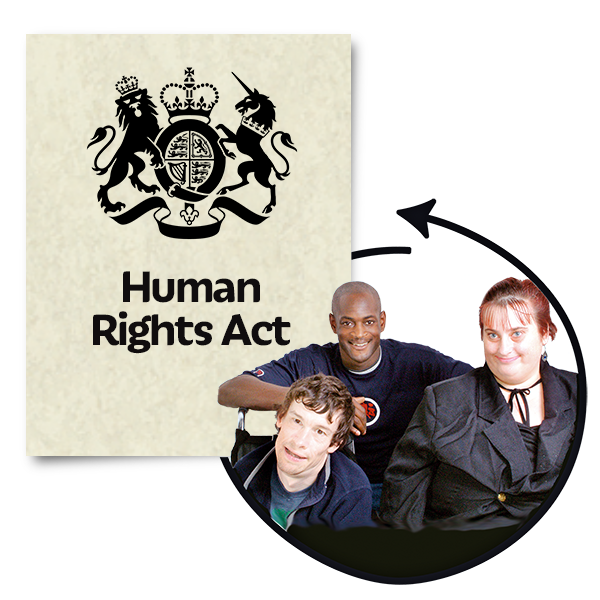Today's Joint Committee on
Human Rights
 Human
rights
Human
rights
 Rights are the things everyone should be allowed to do like have a say, or go to school.
are the rights that everyone has. These include the right to go to school and the right to start a family.
(JCHR) report, "
The Government
Rights are the things everyone should be allowed to do like have a say, or go to school.
are the rights that everyone has. These include the right to go to school and the right to start a family.
(JCHR) report, "
The Government
 The Government are the people who run the country. The Government decide how much tax people should pay and how things like the National Health Service (NHS) should work.
's response to COVID-19: human rights implications", highlights the concerns it has about the impact of the Government's handling of the coronavirus pandemic on groups, including people with a
learning disability
The Government are the people who run the country. The Government decide how much tax people should pay and how things like the National Health Service (NHS) should work.
's response to COVID-19: human rights implications", highlights the concerns it has about the impact of the Government's handling of the coronavirus pandemic on groups, including people with a
learning disability
 A learning disability is to do with the way someone's brain works. It makes it harder for someone to learn, understand or do things.
.
A learning disability is to do with the way someone's brain works. It makes it harder for someone to learn, understand or do things.
.
Mencap responds to the report and joins calls for urgent Government action to make sure people with a learning disability are protected from human rights abuses and can get equal access to health care ahead of any potential second coronavirus peak.
Jackie O’Sullivan, Executive Director of Communications, Advocacy
Advocacy is when you get support to have your say. and Activism
Activism is taking action to make change. Going to a campaign
A campaign is when people work together to try to change something. event with others, writing letters and speaking up are all ways to take action. at the learning disability charity Mencap, said:
“Clearly, the Government has had to make difficult decisions that have been tough for everyone, but it is increasingly clear is that people with a learning disability are one group who have been hit hardest. Today’s Joint Committee on Human Rights report shines a spotlight on two important areas: people with a learning disability and/or autism
Autism is a disability. Autistic people find it difficult to understand what other people think and feel. They also find it difficult to tell people what they think and feel. Everyone with autism is different. in inpatient units have been at greater risk of human rights abuse during the pandemic and decision-making relating to admission to hospital, in particular critical care, for adults with COVID-19 has discriminated against older and disabled people.
“With family contact cut and CQC inspections reduced during lockdown, families have been terrified about what might be happening to people with a learning disability and/or autism locked away in inpatient units. Some families are reporting that their loved ones are being subjected to increasing use of over-medication and solitary confinement, while others are being denied contact entirely. The Government must urgently implement the recommendations in this report to protect those who are currently locked away, as well as not lose focus on developing the right support and housing in the community
A community is the people and places in an area. that people desperately need to stop admissions and to get people out of inpatient units. People deserve to live in homes not hospitals.
“We have been warning since the start of the pandemic that people with a learning disability were not being given equal access to life-saving medical treatment. Latest data from the Office for National Statistics (ONS) shows that disabled people made up almost six in ten of all COVID-19 deaths. Calls to our helpline show that people have found Government COVID-19 guidance
Guidance means being given clear instructions to be able to do something well. confusing and inaccessible. The Government and NHS England must act to track and remove blanket DNACPRs before we are hit with a second wave – a disability is not a reason to refuse treatment. This is a matter of life or death.”
Read the full Joint Committee on Human Rights report "The Government's response to COVID-19: human rights implications" online here: https://committees.
parliament
 Parliament is a group of people who make laws and check what the government is doing.
.uk/publications/2649/documents/26337/default/
Parliament is a group of people who make laws and check what the government is doing.
.uk/publications/2649/documents/26337/default/
- Ends –
For further information or to arrange interviews, contact Mencap’s media team on:
- media@mencap.org.uk
- 020 7696 5414 (including out of hours).
Notes to editors
About Mencap
There are 1.5 million people with a learning disability in the UK. Mencap works to support people with a learning disability, their families and carers by fighting to change laws, improve services and access to
education
 Education is when you learn things. When you fill in a form to get a job, education means you write where you went to school, college or university.
,
employment
Education is when you learn things. When you fill in a form to get a job, education means you write where you went to school, college or university.
,
employment
 Employment means having a job.
and
leisure
Employment means having a job.
and
leisure
 Leisure is when you have time to do things you enjoy like playing sports or going to the pub.
facilities. Mencap supports thousands of people with a learning disability to live their lives the way they want. www.mencap.org.uk.
Leisure is when you have time to do things you enjoy like playing sports or going to the pub.
facilities. Mencap supports thousands of people with a learning disability to live their lives the way they want. www.mencap.org.uk.
For advice and information about learning disability and Mencap services in your area, contact Mencap’s Freephone Learning Disability Helpline on 0808 808 1111 (9am-6pm, Monday-Friday) or email helpline@mencap.org.uk.
What is a learning disability?
- A learning disability is a reduced intellectual ability which can cause problems with everyday tasks – for example shopping and cooking, or travelling to new places – which affects someone for their whole life;
- Learning disability is NOT a mental illness or a learning difficulty, such as
dyslexia
 Dyslexia is a learning difficulty. People who have dyslexia can find it hard to read, write and spell.
. Very often the term ‘learning difficulty’ is wrongly used interchangeably with ‘learning disability’;
Dyslexia is a learning difficulty. People who have dyslexia can find it hard to read, write and spell.
. Very often the term ‘learning difficulty’ is wrongly used interchangeably with ‘learning disability’; - People with a learning disability can take longer to learn new things and may need support to develop new skills, understand difficult information and engage with other people. The level of support someone needs is different with every individual. For example, someone with a severe learning disability might need much more support with daily tasks than someone with a mild learning disability.